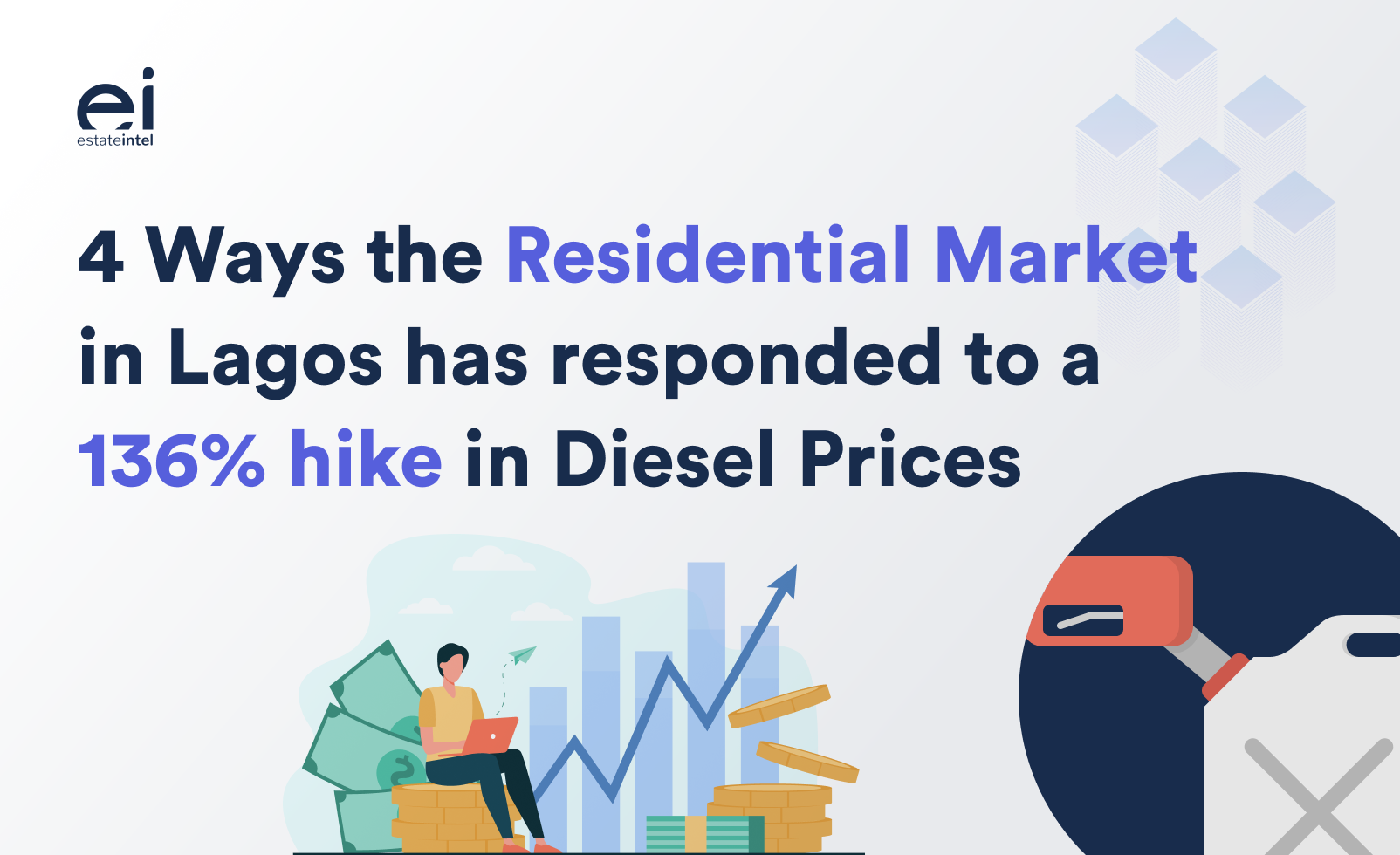Here's how the Residential Market has responded to a 136% hike in Diesel Prices
Dolapo Omidire . 1 year ago

Share this post
Subscribe to our newsletter
The past seven months have seen the price per litre of diesel increase by a staggering 136% from ₦330 to ₦780. The resultant effects have varied, including a surge in inflation, recorded at a 5-year high of 18.6% in June, as well as rising costs for residential and commercial property occupiers. …
The past seven months have seen the price per litre of diesel increase by a staggering 136% from ₦330 to ₦780. The resultant effects have varied, including a surge in inflation, recorded at a 5-year high of 18.6% in June, as well as rising costs for residential and commercial property occupiers.


In March, we started documenting how residential occupiers and facility managers were responding. With the help of Venco and Gatepass, we also tracked the movement in tariffs and energy policy changes in multiple residential communities within the country. Here are 6 major trends we have noted so far:
Average Tariffs have grown 76% from ₦90 per KwH to ₦178/KwH
We surveyed 22 estates in Yaba, Ikeja, Surulere, Victoria Island, Lekki Phase 1, Ikoyi, Osapa, Chevron and Ajah. Our analysis shows that the average tariff grew 76% from 90/KwH to 178/KwH between February and July.

To put this in context, typical occupancy costs in managed or serviced properties are usually broken down as shown below:

As it is impossible to accurately estimate the amount of power that will be supplied from the national grid, facility managers and landlords typically ask occupiers to pay a deposit based on expected consumption. This deposit will be drawn down based on metered usage or a simple split between all the occupiers. Rollovers or top-up requests will be made as required.
All the serviced estates and communities we selected for this analysis operate a tariff-based system, which involves a single energy cost that blends payments to the national grid and payment for internally generated energy, usually diesel. These tariffs, typically measured as Naira per Kilowatt Hour, allow a relatively simple way for occupiers to be billed on all their energy consumption.
Based on the analysis above, this means the average 3-bedroom apartment has seen its total energy expenses grow from ₦70,000 to ₦140,000 per month in the space of 6 months. In the high inflationary environment, we are in, where incomes are yet to rise, this should illustrate how difficult things are getting for the average Nigerian.
Speaking on the tariff price increases, Nahel Jarmakani, Managing Director of Green Key Facility Management explained: ‘Before the crises, anyone who had surveyed the market would see tariffs ranging from N70 per KwH to as high as N95 per kWh. GreenKey was on the lower end and had posted N72-N78 across all estates we manage. Having an attractive rate was a key competitive advantage and helped to keep our customer retention high. When the crises hit, these rates were unattainable and a sharp increase was expected. What was not expected was how sharp it would be as some estates started to charge as high as N320 per kWh! Naturally, many owners’ board or community managers started to scrutinise how these tariffs were being calculated, any facility manager without a good and transparent system was in trouble.’
Flight to Management and Management Quality
A central theme emerging from our research has been the importance of facility managers within multi-family residential properties or estates.
As the diesel prices rose, tenants are spending more time scrutinising how spending is taking place and are also requesting better accountability on all expenses from the facility manager that is responsible. This extra scrutiny reveals how badly the assets’ accounts were managed.
Some of the emergent issues recorded included;
- Reallocation of diesel purchase deposits into other expenses.
- Usage of service charges for Landlord-related expenses.
- Poor record keeping in most residences.
These challenges have demonstrated the need for better management with some occupiers opting for properties with a better management track record.
A newlywed couple who occupy a 2-bed apartment in Victoria Island had this to say about their experience over the past 6 months: “For us, the diesel price increase exposed the inefficiencies of our facility manager and the facility management process. Prior to a recent change, we weren’t given an account of how the service charge was being spent, so it was difficult to know if we had surpluses or deficiencies. Obviously, when diesel prices went up and the facility manager asked for more money, tenants were reluctant to pay, not because we weren’t aware of the increases, but because we were sceptical of how the funds were being managed. Even though our old facility manager was replaced, the new person also doesn’t have the ability to do much. My household has decided to leave and we also know some other tenants that are making similar arrangements.”
On the other hand, for well-managed estates, the diesel price increase merely reinforced the management capacity of the facility managers.
Samuel, an occupier of a 2 bed in Lekki Phase 1 attributes the resilience and ability of their estate to keep operations stable to the simple, clear and concise reporting that the facility managers have been conducting for years. While the increase in prices meant that adjustments in usage had to be made, the existing standard of transparency made navigating new challenges easy.
In a 2017 survey designed by Estate Intel to understand apartment purchasing behaviour for HNIs in Ikoyi, Victoria Island, Lekki Phase and Oniru, facility management of the property emerged as the key factor that respondents were willing to pay the highest premium on average prices for. Prospective buyers indicated a willingness to pay up to a 12.4% premium above market prices for a property managed by an experienced facility manager.

The number of guaranteed power hours has now been reduced by half in the majority of estates surveyed
Within the 22 residential estates analysed, we noted that up to 60% reduced their 24-hour power guarantee to 12-15 hours. While this is sufficient in some instances, it presents a challenge to tenants, especially in the wake of the emerging trend toward remote working. This has resulted in some residents spending more time in the office, despite having the flexibility to work from home.
Among the communities we analysed, only a handful chose to maintain their power availability policy at a guaranteed 24 hours. Interestingly, a common theme among these estates was the level of transparency that existed prior to the diesel price hike. This has made it easy for people to easily decide where to cut off excesses and make savings, and what to adjust to ensure that changes to service were not made.
MKO Balogun, the Managing Director of Global PFI explained to us that “…residential properties have navigated the current challenges in 4 major ways including reducing generator operating hours, considering alternative sources of power, cost recovery through proper metering and efficient energy usage.”
On energy efficiency, Nahel from Green Key Facility Management also noted that: “Many estates started to also realise that their generator sizing, relative to their actual consumption, was far apart. For example, we had an estate approach us for an assessment of their energy systems and we found that they were running a Generator of 250kVA on a 25kVA load!”
Rent Vs Service Charge + Energy Costs – who wins?
Finally, when Estate Intel originally pointed out this staggering insight into how the diesel price and rising inflation are affecting the average Nigerian, we explained that this was not complemented by an increase in disposable household income. If this increase in energy and building operational costs is sustained, the amount available to spend on rent will have to be reduced. People currently searching for property are increasingly seeing that the gap between energy costs and rent is fast closing. Unfortunately, given the state of the economy, total budgets for rent are largely shrinking. So with diesel prices rising, it means the amount of spend on rent remains limited.
This is further set to be exacerbated by the recent NNPC’s approval of a new increase of the petrol pump price from ₦145/litre to ₦179/litre; and the Naira’s recent depreciation further to an all-time low of ₦710/$ on the 25th of July (35% year to date). As a result, more inflationary pressure is expected and we expect this will further impact occupiers throughout this year.
We love your feedback! Let us know how else you would advise residential occupiers to manage these tough times, outside of finding a good facility manager by sending us an email at [email protected].
Related News
You will find these interesting

Bisi Adedun . October 12, 2023
Jabi is an area located within the phase 2 vicinity of the Abuja Municipality, known for housing the iconic Jabi Lake. I...
abuja
Jabi Lake

Tilda Mwai . August 23, 2023
africa
Africa real estate outlook

Deborah Jesusegun . June 02, 2023
African
building